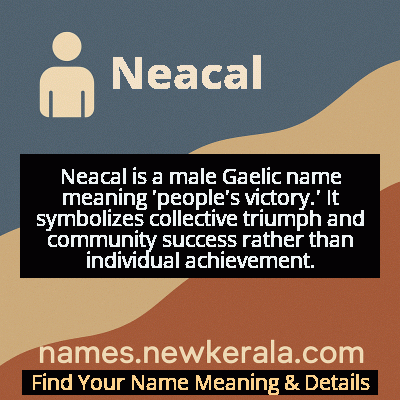Neacal Name Meaning & Details
Origin, Popularity, Numerology Analysis & Name Meaning of Neacal
Discover the origin, meaning, and cultural significance of the name NEACAL. Delve into its historical roots and explore the lasting impact it has had on communities and traditions.
Name
Neacal
Gender
Male
Origin
Gaelic
Lucky Number
9
Meaning of the Name - Neacal
Neacal is a male Gaelic name meaning 'people's victory.' It symbolizes collective triumph and community success rather than individual achievement.
Neacal - Complete Numerology Analysis
Your Numerology Number
Based on Pythagorean Numerology System
Ruling Planet
Mars
Positive Nature
Generous, passionate, energetic, and humanitarian.
Negative Traits
Impulsive, impatient, moody, and can be overly emotional.
Lucky Colours
Red, maroon, scarlet.
Lucky Days
Tuesday.
Lucky Stones
Red coral, garnet.
Harmony Numbers
1, 2, 3, 6.
Best Suited Professions
Military, sports, philanthropy, leadership roles.
What People Like About You
Courage, energy, leadership, generosity.
Famous People Named Neacal
Neacal MacLeòid
Gaelic chieftain
Led successful clan resistance against English expansion in the Scottish Highlands
Neacal MacDhòmhnaill
Poet and scholar
Preserved ancient Gaelic oral traditions and composed influential political poetry
Neacal MacAoidh
Military commander
Victorious in several key battles during the Jacobite uprisings
Neacal MacGilleMhìcheil
Religious reformer
Founded Gaelic-language educational institutions in Nova Scotia
Name Variations & International Equivalents
Click on blue names to explore their detailed meanings. Gray names with will be available soon.
Cultural & Historical Significance
The name gained particular prominence during periods of Gaelic resistance to external domination, where leaders bearing this name often symbolized the people's struggle for cultural preservation. In Scottish Highland communities, Neacal represented both religious devotion (through its connection to Saint Nicholas) and political defiance, creating a unique blend of spiritual and worldly significance that resonated deeply within Gaelic-speaking populations across Scotland and the diaspora.
Throughout history, the name has been associated with community leadership and cultural stewardship, often given to children expected to carry forward Gaelic traditions and language. This cultural significance extends to modern times, where the name serves as a marker of cultural identity and continuity in an increasingly globalized world.
Extended Personality Analysis
Individuals named Neacal are typically perceived as natural leaders with a strong sense of community and collective purpose. They often exhibit charismatic qualities that inspire others, combined with a practical approach to problem-solving that makes them effective in challenging situations. Their inherent understanding of group dynamics allows them to mediate conflicts and build consensus, making them valuable in both personal and professional relationships.
These individuals tend to be resilient and determined, with a deep-seated belief in the power of collective action. They often demonstrate loyalty to their principles and communities, showing particular strength when defending the underprivileged or advocating for shared goals. While they can be stubborn in their convictions, this is typically balanced by a genuine concern for others' wellbeing and a willingness to listen to diverse perspectives before making important decisions.
The name's meaning of 'people's victory' often manifests in a personality that prioritizes group success over individual achievement. Neacals are frequently described as dependable, community-oriented individuals who derive satisfaction from seeing others succeed. They tend to be natural organizers and motivators, capable of bringing people together around common causes while maintaining a humble demeanor that earns them respect and trust.
Modern Usage & Popularity
In contemporary times, Neacal remains primarily used within Gaelic-speaking communities in Scotland and among diaspora populations, particularly in Canada's Maritime provinces. While not among the most common Gaelic names, it has experienced a modest revival as part of the broader Gaelic language and cultural renaissance movement. The name is most frequently encountered in the Western Isles and Highland regions, where traditional naming practices maintain stronger roots. Modern usage often reflects a conscious choice to preserve cultural heritage, with parents selecting the name for its authentic Gaelic character and meaningful symbolism rather than following popular naming trends. The name appears occasionally in birth registrations in Scotland, though it remains relatively rare compared to its English equivalent Nicholas, indicating its continued status as a culturally specific rather than mainstream choice.
Symbolic & Spiritual Meanings
Symbolically, Neacal represents the triumph of community over individual interests and the enduring power of collective action. The name carries connotations of resilience, cultural continuity, and the victory of shared values over adversity. It symbolizes the bridge between traditional Gaelic spirituality and contemporary social consciousness, embodying the idea that true success comes through uplifting others rather than personal achievement alone. The name also represents cultural preservation and the ongoing struggle to maintain Gaelic identity in the face of modernization and assimilation pressures, serving as a living connection to ancestral traditions while adapting to contemporary contexts.

